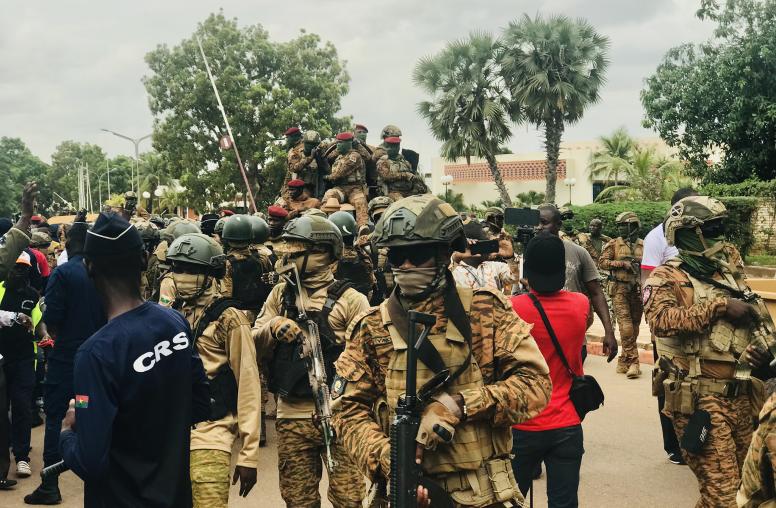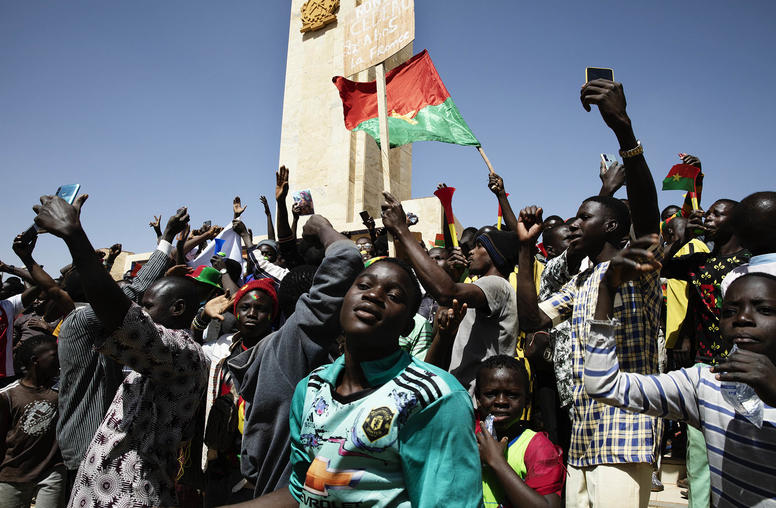In Niger, Foreign Security Interests Undermine Stability—What Can Be Done?
Here are four ways that security assistance providers can avoid trading short-term counterterrorism gains for long-term stabilization in Niger.
Over the past decade, the United States, France, and the European Union (EU) have drastically increased security assistance to countries in the Sahel region. They have done so to address two perceived transnational threats—violent extremism and mass migration to Europe—but have often neglected Sahel countries’ own interests and long-term stability. Nowhere is this more apparent than in Niger, the world’s poorest country. Although in 2018 the country received $1.2 billion in external aid—representing 13 percent of its GDP—it has not made the country safer for Nigeriens. If long-term peace and stability is the end goal of foreign security assistance, donor countries need to center Nigeriens’ priorities in their aid.

The security threat from violent extremist organizations (VEOs) in Niger is significant and increasing. Both the rival Boko Haram factions of Jamatu Ahli is-Sunnah lid-Dawatai wal-Jihad (JAS) and Islamic State West Africa (ISWAP) are active in southeastern Niger. In western Niger, on the border with Mali and Burkina Faso, the Islamic State in the Greater Sahara (ISGS) is active, attacking the state and the population. These conflicts have led to over 200,000 internally displaced persons in Niger and protracted humanitarian crises and government states of emergencies in both the Diffa and Tillabery regions.
A concern to Europe—the ultimate goal of the approximately 202,000 migrants who transited Niger in 2019—transmigration in Niger does not pose a significant security threat to Nigeriens, though drug and human trafficking is a concern.
With so much of Niger’s budget dependent on foreign security sector assistance, the country’s leaders have had to prioritize foreign governments’ security objectives over policies that serve the government and its citizens. Ultimately, these investments undermine democratic accountability, distort policy priorities, and encourage corruption among political elites.
Donor Security Assistance Policy
The Nigerien government has adopted a militarized approach to internal security, in line with donor preferences and underwritten by their funds. Donors publicly acknowledge the dangers of military solutions to security in the Sahel. Yet, emerging policies that reflect the importance of comprehensive investments in development and governance are often not reflected in donor’s financial commitments.
U.S. security policy in Niger has focused on supporting the country’s security forces to fight violent extremist organizations, especially Boko Haram and ISGS. A sizeable U.S. military footprint (800 Department of Defense personnel in 2019) directly trains, equips, and provides operational support to Nigerien security forces. The United States also maintains three bases in Niger, focused on intelligence and support to neighboring countries. Compared to this sizeable investment in security, assistance for peace, democracy and governance, and human rights amounted to only $3.8 million in U.S. funding in 2020.
French security policy has similarly prioritized maintaining its own security interests in the region, with the French favoring more direct military intervention. France has deployed 5,100 military forces across Mauritania, Mali, Niger, Burkina Faso, and Chad. In Niger, French military forces are deployed to protect French uranium investments and maintain several military bases. These forces operate under a relatively narrow counterterrorism mandate; they do not participate in policing of migration or drug trafficking. Similar to the United States, the French have also begun to securitize their economic and social development aid to Niger and other countries in the Sahel. For example, the French military’s Operation Barkhane has started to engage in development projects in Niger in efforts to promote stabilization.
Unlike the counterterrorism priorities of France and the United States, the primary objective of EU security policy in Niger is to prevent sub-Saharan African migrants from traveling through Niger on to Europe. The EU has invested heavily in supporting the Nigerien state, funding capacity building of security services with a focus on border security. It has also been the primary funder of International Organization for Migration projects in Niger that repatriate migrants. When Niger’s parliament criminalized transporting migrants through the country, they received an EU commitment of $1.16 billion in security assistance, heavily focused on stemming migration.
Niger has a history of military coup d’états, weak governance (especially in the security sector), and ineffective and politicized security services. There is an appropriate role for foreign security sector assistance to strengthen the long-term security of Niger by improving security sector effectiveness and accountability. But by providing a steady flow of funds to the security sector without a focus on governance, transparency, accountability, or Nigeriens’ security priorities and realities, security assistance providers are undermining the government’s transparency and fueling corruption.
The Way Forward
Ultimately, long-term peace and stability that benefits Nigeriens and security sector assistance providing-countries will require policy that centers Nigeriens’ priorities and interests in decision-making. This will require security assistance providing countries to treat the Nigerien government like a partner, not a client, and to occasionally trade short-term counterterrorism gains for long-term stabilization. Here are four recommendations for how this can be done:
1. Prioritize the concerns of the Nigerien people.
Both the Nigerien government and foreign donors have ignored the top security concerns of the Nigerien population. Our own work shows that average Nigeriens are most concerned about intercommunal conflict, land tenure, and banditry (including but not limited to cattle theft), and violent crime. Nigeriens care about violent extremism and are concerned about its growing influence in their country, but it is not the only security issue they would like to see the government address. Nigerien respondents to the 2018 Afrobarometer identified poverty and failures of basic service provision as the most important problems in their own lives.
As different ways of providing security cooperation have proliferated, security assistance providers need to harmonize their investments and define how they will cooperate and meet different security needs. When conflicts over priorities do arise between the Nigerien government and security assistance providers, Nigeriens’ interests should come first, even if this means that the Nigerien government forgoes some security assistance.
2. Strengthen transparency and accountability of security assistance.
Donors pour billions into the Sahel without local knowledge and oversight of how security priorities are determined and how security assistance is spent in their own country. Donors should increase transparency while also supporting efforts for Nigeriens to demand transparency from their own government. Donors can share all non-sensitive security assistance information. This would include, for example, the number of police or gendarmes trained in crowd control—but could reasonably exclude transfers of intelligence equipment. Publishing easily accessible information about the total material support provided to countries is also critical to this form of oversight. Supporting the training and funding of local journalists to cover topics related to security and security assistance will improve governance in Niger and the Sahel writ large. Improved transparency can root out corruption and security sector abuses that reduce the population’s trust in the security services and in the government.
3. Hold security services accountable for atrocities and misconduct.
Security sector abuses are key grievances driving violent extremism in Niger and throughout the Sahel. The security services are a symbol of an extractive state who arbitrarily enforce the laws. Widespread security service abuses and impunity are driving increased insecurity and undermining the legitimacy of both the security services and the state. Security assistance providers must hold Niger and other Sahelian partners accountable for their security services’ misconduct. Looking specifically at the United States, this accountability should move beyond the mere Leahy Vetting Policy—which prevents the United States from providing training or support for individuals who are parts of units that have committed abuses—and should withhold equipment and funding following misconduct.
4. Stop asking Niger, and other countries in the Sahel, to increase their security spending.
Over the past 10 years, Niger has dramatically increased its security spending as a percentage of its GDP. These heavy investments in the security services have meant smaller investments in health, education, and other basic services that are critical to the well-being of the population. Instead of encouraging Niger to try to develop large and expensive conventional security services, security sector assistance providers should embrace hybridity and recognize the contributions of customary and informal justice and security providers in Niger and elsewhere in the Sahel.
U.S., French, and EU investments in Niger have an opportunity to strengthen governance and support peace and security. Until these efforts prioritize everyday Nigeriens’ interests, long-term stability, and good governance, they will remain counterproductive. As the recent coup d’état in Mali shows, extensive external security assistance and even foreign troop presence is not a prophylactic against government failure. When this security assistance undermines governance and legitimacy, it is weakening the very states it is intended to support.
Allison Grossman is a PhD candidate in political science at the University of California, Berkeley studying global governance in West Africa.



